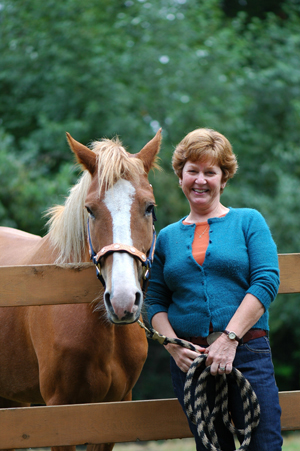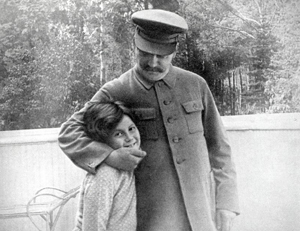A Hard Love to Carry: Molly McFaul in Conversation with Pamela Porter

Malahat volunteer Molly McFaul talks with UVic 50th Anniversary Writing Contest for Poetry winner Pamela Porter about her winning poem, "Photograph: Svetlana Stalin and her Father".
The concept of names is crucial in the life of the Soviet Union’s beloved “little sparrow.” Svetlana Stalin attempted to take her mother’s maiden name, and later, her last husband’s name. She died as Lana Peters but told the Wisconsin State Journal in 2010 that she “…will always be a political prisoner of [her] father’s name.” Your line that echoes this, “carrying his name like iron,” is incredibly powerful. Her father was born Ioseb Besarionis dze Jughasvii, and took on Stalin for himself, which means “man of steel.” What do you think about the power of names and the weight we carry with our own throughout our lives?
A particular name, with all its implications, has a way of getting inside us faster than the critical part of our brains can process. I felt for Svetlana, or Lana, not only because she was, as she put it, “a political prisoner” of history, but also because she could not un-love the affectionate and empowering father whom she experienced as a young child. I think Svetlana and her struggle with her father’s legacy is a kind of archetype for many women who need to come to terms with the contradictory personalities of their own fathers whose presence may be the primary source of a daughter’s internalized power, or conversely, the source of repression of her power, or both. As well, the long-term absence of a father is in itself a powerful influence. Perhaps that’s part of the reason why so much gets written about fathers; we need to employ all the genres to try to come to terms with this relationship.
I read an online profile of you by Dave Jenkinson and in it you mentioned loving the board game Authors in your adolescence. Would becoming one of the Authors in an updated version of this game make your literary goal list? Or has that list taken on new items during your career as a poet and author?
Oh, I think I was about ten; the authors on the board were predominately American writers and mostly men. I’m afraid, though, that an updated version of the game might lean heavily toward celebrity writers like Dan Brown and Stephen King, with nary a contemporary Emily Dickinson among them. Or any poet, for that matter. But my literary goal list has shrunk considerably in recent years. I once longed to be part of the literary festival scene, but I lost that desire along the way, and realized that there are more important things in life than being well-known. Now my list encompasses dividing my time between writing my poems, reading other poets’ work, feeding my horses in the pasture and the birds on the porch, and I’ll let time and my children decide what to do with my poems when I’m gone.
I am curious about the fine line between the implicit trust in a father’s word and the daughter’s awareness to start believing differently. Can you possibly explore your own question of “What is love to do then?” once belief in a figure has been irreparably altered or shattered?
I know many daughters who are spending much of their adult lives wrestling with that very question. The father-daughter relationship certainly contains mythic aspects: as she grows up, the daughter’s own budding power can prove threatening to the father, who then stops affirming her, an act which the daughter reads as betrayal; as well, the father can feel betrayed when the daughter then dismisses him as the primary authority figure in her life. Jane Hirshfield wrote, “Hope is the hardest love we carry.” Lorna Crozier wrote, “We live with who we are and not what we once wanted.” To ask the question, “What is love to do then?” may be the starting point, not just for fathers and daughters, but for all of us, to a fully and deeply lived life. It is the space we find we inhabit when we set out to explore the landscape of the heart. And I believe it is the question we require of all literature to address. It’s only when we dare to look straight into the exigencies of the heart that we take real risks. It takes courage to ask such a question and to hang around long enough to listen for an answer, if it comes. But that’s what living genuinely is about, and it seems to me it’s also the birthplace of literature.
Svetlana Stalin, as Lana Peters, passed away on November 22, 2011. If you could have had the chance to speak with her, what would you have hoped to learn from her?

I would have liked to know what were the images, sounds, and phrases from childhood that never left her memory―those scraps and shards of the past that kept circulating through her even after many decades. It’s fascinating, the things that stay with us all our lives, no matter how small or seemingly inconsequential they may be―it’s the stuff of poetry, really.
How did this poem come into being? Were you familiar with her story and her famous defection or did you happen across the photograph?
I happened to open the Times Colonist newspaper to her obituary, which included the photograph of Svetlana snuggled under the arm of her uniformed father. I wasn’t familiar with her story but was quite taken by the photograph, made even more haunting through the perspective of history. I thought, what a burden she carried, even as a child. Such a hard love to carry. Something inside me resonated with her, at least in part, and I understood that I would need to write this poem. I didn’t expect that my poem would achieve anything other than my own need to articulate how hard it is sometimes to love, but that we often do it anyway. I certainly didn’t know the poem would ultimately have a life of its own.

Molly McFaul
* * * * * * * *
Read Pamlea Porter's winning poem here.









